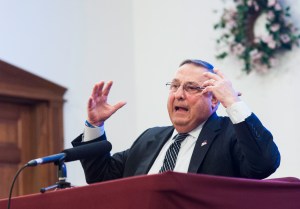“The press is going to love me (for this tip),” LePage said, adding that he will lead a citizen initiative to get his tax reform and relief plan to referendum if the Legislature doesn’t take meaningful action to reduce the income tax before breaking for the summer.
LePage also said he will veto every bill that goes before him until legislators break or until they take action, meaning that the bills would then go back to the Legislature and would need a two-thirds vote to pass.
“I passed the budget up to the Legislature in January,” LePage said. He looked at the budget line by line and he said he doesn’t think any one of the legislators has read it yet.
LePage also said he put in a constitutional amendment to eliminate income tax, but the Legislature won’t approve it. Democrats and some Republicans are making deals behind locked doors, he said. The Legislature is not working for the Maine people, he said.
“It’s mind-boggling to me how they think,” LePage said of the Legislature.
According to Peter Steele, the governor’s director of communications, this was the ninth town meeting LePage has held in the state and all of them had crowds similar to Lisbon’s, where the majority clapped in support of LePage’s plan for reducing and eventually eliminating the state income tax.
Eight of the 10 most prosperous states in America don’t have income tax, LePage said, adding that the 10 lowest-rated states all have an income tax.
Businesses, LePage said, look for three things when deciding where to locate: consistent and reliable tax laws, good governance and low energy costs. Maine has the ninth-highest income tax in the country, he said.
There are several hundred jobs in the budget that aren’t filled, he said. “They’re in there, but they’re empty. The Legislature refuses to take them out.”
If there is a surplus at the end of the year, the Legislature decides how to spend those funds on the last day, LePage said.
Contrary to what has been reported, LePage said, $62 million in revenue-sharing was not taken out of the budget. It was moved to property-tax relief, which will be provided directly to the taxpayer. According to a pamphlet outlining the plan, “the budget increases the maximum property-tax fairness credit from $900 to $1,500 for a filer over 65, giving direct property relief to Maine seniors.”
LePage said he wanted more drug enforcement agents and more judges, but what the Legislature gave him were three more custodians. The governor also talked about undocumented asylum-seekers and top-heavy administration in education.
“Everyone’s talking about raising the minimum wage,” LePage said, but all that does is increase the cost of goods and services.
Maine was the No. 1 welfare state in America before his cuts to the Maine Department of Health and Human Services, LePage said. Now we’re No. 3, he said.


Comments are no longer available on this story